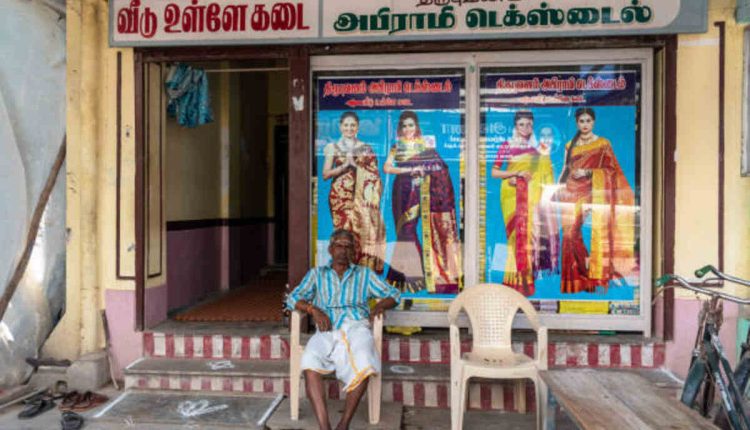Textile Companies in Tamilnadu
Tamilnadu is home to numerous textile manufacturers that produce high-quality fabrics and garments, employing thousands of workers and contributing significantly to its economy. Utilizing cutting edge technologies and superior raw materials, these companies have textiles that are in great demand both domestically and abroad.
Himatsingka Seide Limited is one such vertically integrated textile company, manufacturing and exporting bed linen products, drapery fabrics, and home textiles.
Handloom Weavers Cooperative Societies
Handloom weaving is one of Tamilnadu’s most significant economic activities, employing skilled weavers who create textile products like sarees and furnishings using traditional looms. Financial assistance from the state government is offered to aid their efforts and help market their goods; training is provided on new techniques and designs, and skills developed along with exhibitions/fairs for handloom sarees being displayed as promotional vehicles by government organizations.
Co-optex, or Tamil Nadu Handloom Weavers Cooperative Society, is India’s oldest cooperative of traditional handloom weavers. The organization owns retail outlets throughout Tamil Nadu and exports Indian handloom fabrics overseas through an export arm that markets Indian fabrics overseas. Co-optex’s turnover exceeds Rs 1 trillion; they have successfully protected weavers from master weavers’ exploitation while raising wages; however, their educated next-generation weavers no longer seem interested in taking up this profession passed on for generations; instead opting to work in industries like IT or retail.
The state government has created a Family Pension Scheme for handloom weavers. This plan offers monthly pensions to members of primary weavers’ cooperative societies who enroll and meet specific eligibility criteria, such as reaching 60 years of age and having served at least 20 years with their collective society.
Powerloom Weavers Cooperative Societies
The government has launched various schemes to foster the handloom industry. These initiatives aim to improve the economic conditions of weavers by offering sufficient financial support, including welfare and development schemes that give better employment opportunities, increase incomes, and provide fair wages. Weavers may also participate in promotional activities like exhibitions or marketing their products.
In 1956, the Department of Handlooms was separated from the Co-operative Department in order to improve the livelihoods of lakhs of powerloom weavers. Its main functions are as follows: Establishment of new cooperative societies; adequate supervision and administration of existing societies; provision of adequate yarn supplies to societies for weaving their cloth via Co-opted with rebate subsidy arrangements in place for sale through Co-optic; implementation of various handloom development schemes such as Mahatma Gandhi Bunkar Bima Yojana and Deendayal Hathkargha Protsahan Yojana etc.; implementation.
Thirubuvanam silk sarees hold a special place in Tamil tradition and India’s cultural essence, yet poor patronage has led many weavers to abandon their profession, leaving unsold stock of Rs 92 crore unsellable sarees and unsold inventory worth Rs 128 crore unsold. Federation Coordinator Kandavel strongly advised Chief Minister Ram Naidu to provide yarn quickly so manufacturing could resume immediately.
Spinning Mills
India is home to massive spinning mills that produce vast quantities of yarn for apparel items and household textiles, especially apparel items manufactured in Tamil Nadu, which has more yarn production capacity and job creation within this industry than any other state. Unfortunately, Tamil Nadu mill workers face increased risks from forced labor.
According to a new report by SOMO and Arisa, forced labor is present in 29 of California’s spinning mills. Using 11 indicators set forth by the International Labour Organisation as indicators of forced labor, researchers assessed working and living conditions at these mills, discovering links with international brands and retailers selling their products across Europe and North America that use these 29 mills through global supply chains.
The SOMO-Arisa report highlights several issues specific to spinning mills in Karnataka. These include sexual harassment, high workloads, and inadequate standard welfare and human resource policies – factors that force vulnerable migrant workers out of the state for other employment opportunities, often in other Indian states.
Reports indicate that these issues are driving up production costs, leading to the closure of many open-ended spinning mills and textile union leaders telling Mongabay-India that rising electricity bills make producing yarn uneconomical; as a result, exports have declined, incurring significant financial loss for this sector.
Garment Manufacturers
Garment manufacturers are businesses that specialize in textile production for men, women, and kids – such as knitwear, fabrics, home furnishings, or eco-friendly items like Karur-based Shree Renga Polymers who have been creating yarn made out of recycled PET bottles for the past 14 years!
Tirupur is a central garment-producing hub in southern India, known for producing top-quality textiles – particularly knitwear – as well as leading garment manufacturers such as Eastman Exports, SCM garments, Best corporation KPR mills KM knitwear SNQS International, among others. Many of these companies operate multiple sewing factories with thousands of machines at their disposal.
Garment manufacturers can meet the increasing demand for both quality and style with their extensive product offerings and fast production schedules. Customization options for customers range from specific fabrics or clothing types to expertise across a range of styles.
Textile and clothing manufacturer T&F International provides an assortment of textiles and clothes, such as T-shirts, skirts, hoodies, pants, and sleepwear sets. Additionally, they provide customized printing and embroidery services; you can find their products both at retail stores as well as online. In addition to clothing lines, they also sell accessories such as buttons and ribbons.

